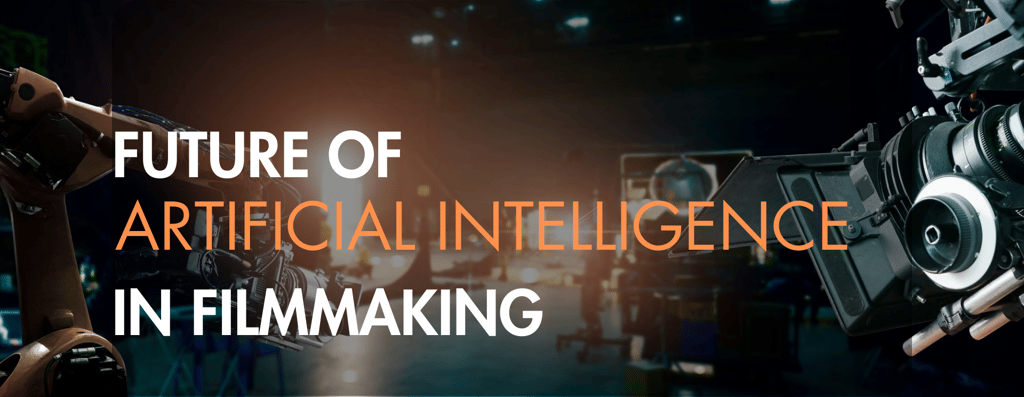Future of AI in Filmmaking
While the integration of AI in filmmaking presents exciting opportunities, ethical considerations and responsible use of technology will be essential. Striking a balance between innovation and preserving the authenticity of human creativity will be crucial for the successful implementation of AI in the future of filmmaking.
FILM
Ipshita
12/9/20235 min read


Artificial Intelligence (AI) has emerged as a powerful force reshaping the landscape of filmmaking, offering innovative solutions at every stage of the film production process. From scriptwriting to post-production, AI is not just streamlining workflows but also pushing the boundaries of creativity. Let's delve into the various aspects of filmmaking and explore how AI is redefining the art and craft of cinema.
Scriptwriting:
AI-powered tools are revolutionizing the early stages of filmmaking by assisting in scriptwriting and story development. By analysing vast datasets of successful scripts, AI algorithms can generate insights into narrative structures, character arcs, and plot dynamics. Filmmakers, including those behind the scenes of Sunspring (2016), a short film entirely written by an AI, are tapping into AI's potential to enhance the ideation process.
Casting:
AI plays a role in casting decisions and character creation. Facial recognition technology aids casting directors in finding film actors who fit specific criteria, streamlining the selection process. Additionally, AI can analyse historical film performances to predict an actor's compatibility with a particular role, ensuring a better match between character and performer. Beyond human actors, AI is also venturing into creating virtual characters, offering filmmakers an array of creative possibilities. Filmmakers like Tony Kaye, with his film "2nd Born" (in development), are exploring the possibilities of using AI to create virtual actors alongside human ones.
Virtual Film Production:
AI-driven pre-visualization tools are enhancing filmmakers' ability to plan and visualize scenes before the actual shoot. Virtual production, powered by AI and real-time rendering, allows film directors to immerse themselves in a virtual environment and make creative decisions on the fly. Directors like Jon Favreau, with The Lion King (2019), utilized AI to enhance virtual production, creating realistic environments that seamlessly integrate with live-action elements. This not only streamlines the filmmaking process but also facilitates collaboration among different departments, resulting in more efficient and dynamic productions.
Filming and Shot Composition:
AI technologies are influencing the filming process by assisting in shot composition and camera work. Autonomous drones equipped with AI algorithms can capture complex shots with precision, eliminating the need for extensive manual control. AI-driven systems can analyse scenes in real time, suggesting optimal camera angles and movements to enhance visual storytelling. This collaboration between human creativity and AI precision leads to visually stunning and technically refined cinematography. Filmmakers, inspired by AI precision, are incorporating this technology into their cinematography, as seen in the works of drone-shot sequences in Cognition (2019).
Editing and Post-Production:
AI is a game-changer in the post-production phase, offering innovative solutions for editing, colour grading, and visual effects. Automated editing algorithms can analyse the emotional tone of a scene, ensuring a seamless flow that resonates with the intended film audience. AI tools like IBM's Watson enable filmmakers to automate aspects of the colour grading process, saving time and ensuring consistency. Zone Out, a short film edited by an AI algorithm, showcases the potential of AI in shaping the final narrative. Deep learning algorithms are also being employed to generate realistic visual effects, reducing the manual labour traditionally associated with CGI.
Music and Sound Design:
The emotional impact of a film is often heightened by its musical score and sound design. AI-driven tools are entering the realm of music composition, generating scores that complement the mood and pacing of a film. Programs like AIVA and Amper Music use AI algorithms to compose original music, providing filmmakers with customizable soundtracks tailored to their vision. The collaboration between AI and composers, as seen in the composition of AI-generated scores for Morgan (2016), opens new avenues for auditory storytelling.
Film Distribution and Audience Engagement:
AI is reshaping the way films are distributed and how audiences engage with content. Recommendation algorithms, employed by streaming platforms like Netflix and Amazon Prime, leverage AI to understand viewer preferences and suggest personalized content. AI-driven analytics help filmmakers and studios understand audience reactions, enabling data-driven decisions on marketing strategies and future projects. Virtual Reality (VR) experiences, guided by AI, are also emerging as a new form of immersive storytelling, allowing audiences to interact with narratives in unprecedented ways. The impact of AI on audience engagement is evident in virtual reality experiences like Spheres (2018), where AI guides viewers through immersive storytelling.
Ethical Considerations:
While AI opens up exciting possibilities, it also raises ethical concerns, particularly with the advent of deepfake technology. Deepfakes use AI to manipulate or replace elements in videos, including actors' performances. While this technology offers creative potential, it also raises questions about authenticity, consent, and the potential for misinformation. Filmmakers like Jordan Peele, with his deepfake portrayal of President Obama in a public service announcement, highlight both the creative potential and ethical challenges associated with this technology.
Challenges and the Human Touch:
Despite its transformative potential, AI in filmmaking is not without challenges. The collaborative and deeply human nature of filmmaking relies on intuition, creativity, and emotional intelligence—qualities that AI struggles to replicate. Renowned directors like Christopher Nolan emphasize the irreplaceable role of human creativity in storytelling, underscoring the importance of maintaining a delicate balance between technology and human intuition.
The Future of AI in Filmmaking:
As AI technologies continue to advance, the future of filmmaking holds exciting possibilities. Machine learning models may evolve to better understand nuanced aspects of storytelling, enabling AI to contribute more substantively to creative processes. Virtual production techniques driven by AI may become standard, offering filmmakers unprecedented flexibility and control. Film festivals, including the Sci-Fi Film Festival with its AI Film category, are recognizing the significance of AI in cinematic expression.
Disadvantages of AI in Filmmaking:
While AI offers remarkable advancements, filmmakers must be vigilant in navigating the ethical challenges and preserving the essential human elements that make filmmaking a deeply personal and emotive art form. These disadvantages underscore the need for a balanced and thoughtful integration of AI in filmmaking.
Limited Intuition and Emotional Intelligence:
AI lacks the nuanced understanding of human emotions and intuitive decision-making that is crucial in filmmaking.
The subtle nuances, empathy, and emotional depth brought by human filmmakers may be challenging for AI to replicate.
Ethical Concerns with Deepfake Technology:
Deepfake technology raises ethical issues related to authenticity and consent in filmmaking.
Misuse of deepfakes can lead to misinformation, identity theft, and potential harm to individuals portrayed without their consent.
Complex Navigation of Ethical Challenges:
Filmmakers using AI must navigate complex ethical considerations, especially in the realm of deepfake technology.
Balancing creative expression with responsible and ethical use of AI tools requires careful attention and consideration.
Risk of Overreliance on AI:
Overreliance on AI tools may lead to a reduction in the diversity of creative approaches in filmmaking.
The danger of formulaic storytelling emerges when AI becomes the primary driver, potentially diminishing the uniqueness, depth, and authenticity associated with human-driven narratives.
Potential Loss of Human Touch:
The collaborative and deeply human nature of filmmaking thrives on the unique touch, instincts, and experiences brought by human creators.
Excessive reliance on AI may lead to a depersonalized approach, risking the loss of the distinctive human touch that contributes to the richness of cinematic storytelling.
In conclusion, AI is fundamentally transforming the landscape of filmmaking, introducing efficiencies and creative possibilities. Filmmakers and industry professionals are embracing AI tools across various stages of film production, with notable examples highlighting the potential of this technological revolution. While challenges and ethical considerations persist, the collaboration between human creativity and AI promises to redefine film industry standards and inspire a new era of cinematic innovation. As AI continues to advance, the line between human and machine collaboration in filmmaking will blur, opening doors to unprecedented storytelling possibilities.

Address:
5551 Hollywood Blvd #1307
Los Angeles, CA 90028,
United States of America
